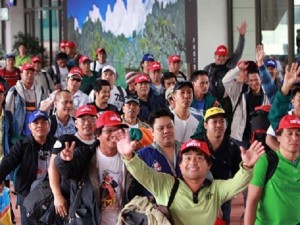PH to ban OFW deployment to 15 countries
 MANILA, Philippines–The government will ban the deployment of overseas Filipino workers to 15 countries for failing to meet the safety requirements of the amended Migrant Workers and Overseas Filipino Act, the head of the Philippine Overseas Employment Administration said Tuesday.
MANILA, Philippines–The government will ban the deployment of overseas Filipino workers to 15 countries for failing to meet the safety requirements of the amended Migrant Workers and Overseas Filipino Act, the head of the Philippine Overseas Employment Administration said Tuesday.
POEA chief Hans Leo Cacdac made the announcement on Tuesday as he emphasized that the Vatican and Monaco were not among the list of countries considered “unsafe” for OFW deployment.
“The deployment will be stopped (for the 15 countries) once the GBR (POEA governing board resolution) takes effect 15 days after publication,” Cacdac said in an interview.
In its resolution on June 28, the POEA governing board said that OFW deployment will not be allowed to those countries that were not included in the list of countries deemed complaint with the safety requirements of the Migrants Act.
The 15 countries were Afghanistan, Chad, Cuba, Democratic People’s Republic of Korea/North Korea, Eritrea, Haiti, Lebanon, Mali, Mauritania, Nepal, Niger, Palestine, Somalia, Uzbekistan, and Zimbabwe.
The Philippines already has an existing deployment ban to Lebanon and Afghanistan due to safety concerns for OFWs working there.
Cacdac said that the government was also reviewing the certifications for Libya and Iraq. The government had previously lifted the deployment ban to Libya and to Kurdistan, the northern region of Iraq, but the DFA has decided to review again the security situation in both countries.
“With respect to Iraq and Libya, there’s a review especially Libya. Iraq is still subject to a security alert level so there’s still a total deployment ban for Iraq except for Kurdistan,” Cacdac said.
“In Libya, deployment is ongoing so while we are awaiting the review of the DFA, the status quo will continue,” he added.
Cacdac reiterated that the Vatican and Monaco were not among those countries that Manila considered as unsafe for OFW deployment.
He said the POEA was just waiting for the DFA to issue the certifications for the two European countries.
Under the Migrant Workers and Overseas Filipino Act, the DFA has to certify countries to determine if they had enough protection for OFWs and this certification should be approved by the POEA board.
To be certified as safe, a country should have “existing labor and social laws protecting the rights of workers; is a signatory to and/or a ratifier of multilateral conventions, declarations or resolutions relating to the protection of workers; and has concluded a bilateral agreement or arrangement with the government on the protection of the rights of OFWs.”
When asked when the DFA would issue those certifications, considering that the amended Migrants Act became law two years ago, Cacdac said: “Well, that is something that the post has to look into but it has nothing to do with the Vatican or Monaco being unsafe.”
“They still have no certification for now. Meaning, they are not definitely in the list of noncompliant countries because we await their certifications,” he said.
“And of course, deployment will continue (for the two countries). There are only a few. In the Vatican, there’s none but for Monaco we have a few … four or five rehires in a year,” Cacdac added.
In its resolution on June 28, the POEA board also approved the certification of 32 countries–including Syria, Saudi Arabia, and Kuwait— that were earlier deemed “partially compliant” as “compliant” countries after Congress allowed the move while DFA negotiates agreements with these countries to improve OFW safety.
“The list of compliant countries pertains to labor and employment conditions for OFWs. This does not affect the outstanding deployment ban to Syria on account of the security situation there,” Cacdac said.














